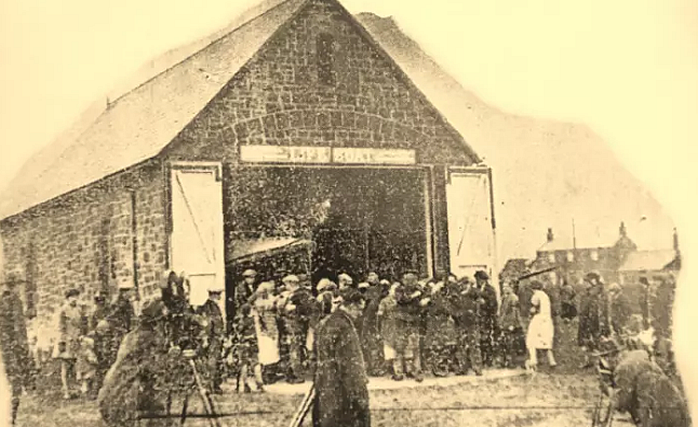Lifeboats
Cresswell Village Hall was once the Cresswell lifeboat station. We present here some of the important dates and events in the history of the station.

On the 23rd Nov 1861, before the lifeboat house was built, the schooner Julius of Alberg ran aground on the Broad Carr Rocks (Broad Skear). “Big Tom” Brown and his sons managed to get a coble to the wreck and rescue the crew of 6 before the schooner broke up. For such a difficult rescue, the RNLI awarded a Silver Medal and £1 to Big Tom and £1 to each of the boat’s crew.
9th March 1874. James Brown (brother of Big Tom) and his 3 sons were returning to Cresswell after a fishing trip. Their boat was in sight of land when a heavy squall capsized it. All 4 drowned. James Brown was 51, Thomas 30, John 21 and George 14. It was this disaster that led to an appeal to the RNLI for a Lifeboat Station and this was agreed to at a meeting on 7th May 1874. The whole cost of the station was defrayed by Thomas Hackwood Esq and the boat named, at his request, Old Potter. It was self righting & built by Messrs Forrestt of Limehouse. It cost £328 plus £114 for the launching carriage. The boat house cost £154, the site having been donated by AJ Baker Cresswell together with the dressed stone for the building.
The station was opened on 21st August 1875. 1875. Lifeboat House built (now the Village Hall)
5th Jan 1876. Steamer Gustav of Gothenburg ran aground on rocks in Druridge bay. 14 people on board including 3 women. Due to the state of the sea it was impossible to launch Old Potter from the lifeboat house so men, women and horses dragged the boat and launching carriage half a mile up the bay. The Gustav carried 2 boats one of which was smashed when she ran aground, the other breaking loose with 4 sailors in it. This boat overturned and stranded on rocks near the shore. The local women, including Margaret Brown, four times formed a human chain to rescue the men clinging to the overturned boat. Despite several attempts the Old Potter was unable to reach the Gustav so it was decided that the Newbiggin Rocket Life- Saving apparatus was needed. Margaret Brown, together with Mary Brown & Isabella Armstrong, volunteered to make the 5 mile journey. They reached Newbiggin exhausted but managed to raise the alarm. In the meantime, however, Old Potter had managed to reach the Gustav and rescue the remaining crew and passengers.
For their courage and endurance, Mary & Isabella were presented with inscribed brooches and Margaret with a silver teapot (1). Margaret did not miss a quarterly practice or service launch from 1875 to 1921 and for this long and distinguished service the RNLI awarded her a Gold Brooch and the RNLI’s Record of Thanks. These were presented to her at a special service on 14th January 1922. She died in 1928 aged 79 and is buried in Cresswell churchyard. In 1981 the RNLI felt that a permanent memorial should mark her acts of courage and devotion to the Lifeboat Service. Accordingly, a plaque was placed on the south wall of the nave in the church.
1876. Mrs Kitty Brown launched a small boat and rowed singlehanded through the waves to reach a coble which was trying in vain to make harbour.
21st October 1881. The brig Ida of Frederikstadt lay stranded on the Carr Rocks (the Scars) and the lifeboat was unable to reach her. So Adam Brown (son of Big Tom) put a rope around his waist and, with the help of his 2 brothers, managed to get to the brig. He then carried a man with a broken leg back to shore, then another injured man and a boy of 15 with a broken collar bone. He had great difficulty in saving a fourth man but was unable to rescue the captain and another crew member who sadly were drowned.
The Old Potter was replaced by a new lifeboat Ellen and Eliza on 24th August 1889.
1890. Voted second service class to Thomas Brown’s silver medal on his retirement from the post of Coxswain.
30th July 1894. The vicar of Cresswell church & Honorary Secretary of the Cresswell Lifeboat, Robert E Taylor, went swimming in Druridge Bay and was drowned. His body was never found.
6th February 1899. The lifeboat went to the assistance of the steam trawler Lapwing which was stranded on Broad Skear Rock. One of the lifeboatmen, Henry Jefferson, had a slight cold but got soaked to the skin and developed pneumonia. He died on 28th February. In April the RNLI gave £250 to his widow and 5 children. Henry Jefferson had been on every service since 1875.
In 1908, Adam Brown retired as coxswain. He had been coxswain for 15 years and a member of the lifeboat crew for 33 years.
23rd September 1909. The Ellen and Eliza was replaced by a new lifeboat Martha. 22nd February 1914. The Arctic Stream was being towed from Leith to the Tyne but off Newbiggin Point the towing hawser snapped in a gale. The Arctic Stream was driven on to rocks south of Cresswell. Both the Newbiggin lifeboat (Ada Lewis) and Cresswell lifeboat were launched. The Ada Lewis had to be dragged 3 miles to a suitable launching site. Both lifeboats managed to reach the Arctic Stream, the Newbiggin boat rescuing 13 people and the Cresswell boat the remaining 6. Thanks on Vellum were awarded to the coxswains of the lifeboats (William Brown of Cresswell & Watson Brown of Newbiggin).
In 1925 both William Brown (coxswain), aged 70, and James Brown (second coxswain), aged 72, retired. Both men had enrolled in the first lifeboat crew in 1875. William Brown’s wife, Kitty, was awarded a gold brooch by the RNLI in 1925 for loyal service for 40 years. At the same time James Brown’s wife was awarded a Record of Thanks. Both women had been staunch supporters of their husband’s work.
13th to 15th March 1941. Assistance was given to the Empire Breeze and these turned out to be the last launchings by the Cresswell lifeboat before the station closed down in June 1944. The decision to close the Cresswell lifeboat station was probably due to the fact that Amble and Newbiggin had motor lifeboats. Also, due to the war, it was difficult to get sufficient men to crew the boat. After closure the Martha was sold and converted into a motor yacht and named Cresswell.
3rd June 1984. 62 year old John Brown was drowned when his coble sank in rough sea.
